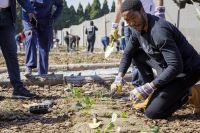Keynote address delivered at the University of Witwatersrand Citizenship and Community Outreach offices’ Volunteer Recognition Event.
Today, we gather to celebrate an extraordinary group of individuals who have dedicated themselves to the transformative power of volunteering. As we stand here on the grounds of the University of the Witwatersrand, we are not just honouring your achievements; we are recognizing the profound shift in perspective that you have brought to the world of volunteering.
In a world marked by complex challenges and inequalities, the spirit of volunteering has evolved beyond simple "do-gooding" to an imperative for making sustainable, lasting impacts within our communities. Your dedication to this evolved ideal is not just commendable; it is inspiring and necessary.
Nelson Mandela, one of the great leaders of our time, believed in the power of volunteering. He famously served as the "Volunteer-In-Chief" during the Defiance Campaign, where individuals (mostly Black and Indian) stood together in peaceful protest against Apartheid. The gains made through the Defiance Campaign were monumental in the fight against Apartheid, illustrating the immense potential of collective volunteerism to overcome even the most entrenched systems of oppression.

Volunteers on Mandela Day 2023.
(Image: Nelson Mandela Foundation)Mandela's legacy reminds us that volunteering is not merely a temporary respite for communities facing adversity but a catalyst for long-term change. It's about forging deep and lasting relationships with the communities we serve.
At the same time, it is crucial for us all to recognise the limits of volunteering as we know it. Volunteering should not merely be a temporary solution, but a commitment to work alongside communities, to listen, learn, and adapt to their needs, and to pursue change that outlasts the temporary volunteer experience.
The Treatment Action Campaign is perhaps most exemplary of the power of volunteerism. Here, over 15 million individuals volunteered their time, energy, and expertise towards eradicating the HIV/AIDS pandemic. This remarkable example of collective volunteerism has not only saved countless lives but demonstrates the incredible influence that volunteers can have when they unite with a common purpose.
The Treatment Action Campaign (TAC) is a South African civil society organization that was founded in 1998 to campaign for access to HIV/AIDS treatment, prevention, and care services. TAC played a significant role in advocating for the rights of people living with HIV/AIDS, especially during a time when access to treatment in South Africa was limited and the HIV/AIDS epidemic was devastating communities.
One of the key strategies employed by TAC was the mobilization of volunteers. These volunteers came from various backgrounds, including healthcare professionals, activists, students, and community members. Their shared goal was to address the HIV/AIDS crisis by raising awareness, providing education, and advocating for policy changes.
Here are 6 powerful ways that volunteers contributed significantly to creating access to care for people living with HIV and AIDS:
- Community Education and Awareness
Volunteers were involved in grassroots initiatives, conducting awareness campaigns in communities most affected by HIV/AIDS. They organized workshops, distributed educational materials, and held community meetings to inform people about prevention methods, the importance of testing, and available treatment options.
- Treatment Literacy
Volunteers were instrumental in providing treatment literacy programs. They educated people about their rights to access treatment, explaining complex medical information in accessible ways. This empowered individuals to make informed decisions about their healthcare.
- Advocacy and Policy Change
Volunteers participated in advocacy efforts, lobbying the government and pharmaceutical companies for affordable and accessible antiretroviral drugs (ARVs). They organized protests, marches, and campaigns, drawing attention to the urgent need for treatment. Their collective voice put pressure on policymakers to change existing policies and prioritize the fight against HIV/AIDS.
- Legal Support
TAC volunteers, including legal professionals, provided legal support to individuals facing discrimination or denial of treatment. They helped people navigate legal systems, ensuring that their rights were protected and advocating against HIV/AIDS-related stigma and discrimination.
- Support Networks
Volunteers established support groups for people living with HIV/AIDS. These networks provided emotional support, facilitated discussions, and shared information about treatment options and healthy living. Creating a sense of community reduced isolation and encouraged individuals to adhere to their treatment plans.
- Research and Data Collection
Volunteers were involved in data collection efforts, helping TAC understand the specific needs of different communities. This data-driven approach allowed TAC to tailor their programs effectively and target areas where help was needed the most.
Through the dedication and hard work of these volunteers, TAC played a pivotal role in changing the landscape of HIV/AIDS treatment in South Africa. Their advocacy and awareness campaigns, supported by the efforts of numerous volunteers, contributed significantly to improving access to treatment, reducing stigma, and ultimately saving lives.
As we celebrate your achievements today, let this moment serve as a reminder that your journey as volunteers is far from over. In fact, it's just beginning. Your commitment to making a sustainable difference in the world is an example for us all. It is a commitment to work alongside communities, to listen, learn, and adapt to their needs, and to pursue change that outlasts the temporary volunteer experience.
All of this, all of this English is me trying to say thank you! Thank you for keeping Wits University a caring space where people can find care and be heard and supported. You have made us so proud, and your journey toward making a sustainable impact has only just begun. Thank you for inspiring us to look beyond the horizon and into the future of volunteering.
Congratulations, and thank you!